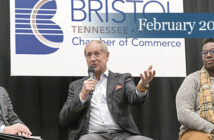By Scott Robertson
The odds are you have driven by the business many times. You may have seen its sign next to Interstate 26’s Gray exit so many times you don’t notice it anymore. But the odds are also good you know very little about the company or its rich history in the region.
Yet TPI has been a Tri-Cities-based manufacturer for the last two-thirds of a century, employing more than 500 people and maintaining a role as an active community citizen and supporter of education and economic development.
In a time when many of the manufacturing concerns that dotted the Tri-Cities landscape have moved on, driven by free trade agreements, overseas labor advantages and other economic factors, TPI has stood the test of time in the region. The company makes products for the electric heating, fan and ventilation, industrial lighting, commercial controls, and industrial oven markets.
Family-owned since 1950
Tennessee Plastics, as it was then known, was started by Bob Henry in a garage on Iris Avenue, in Johnson City 66 years ago. “My uncle Bob was a very customer-oriented individual,” says Dan Berry, executive vice president of sales and marketing for TPI. “We like to think we are still very much the same way today.”
To say the company has done well is an understatement. There are only around 500 family-owned corporations the size of TPI left in America today, says Kay Hale, co-owner and daughter of Bob Henry. As a family-owned, locally based employer, TPI has managed to keep the 40-year-plan in place as an attractive opportunity for its workers in the Tri-Cities at a time when the average American will change jobs 13 times. One production manager recently retired after 45 years with the company.
Hale attributes the low turnover to a very intentional, deliberate hiring and evaluation process. “We have a long-term system that has worked well. We’ve experimented, found the loopholes and closed those. We choose carefully, and then when they get here, I identify us as a corporate family.”
Adds Hale, “People feel comfortable here. We invest in our employees. We help them any way we can within reason. We strive hard, pay attention and listen to the details. You can pick up a lot just by listening, including a lot that you can’t ask.”
It makes more sense to provide a comfortable working environment in which employees can miss their production goals every once in a while without looking over their shoulders, says Aaron Cox, vice president of marketing, co-owner, and Henry’s grandson, because, “turnover is an expense. The more you can avoid having to start over, the better the work environment is going to be for everybody and the less your expense in the hiring process is going to be.”
“We try to make it a long-term relationship with our employees, and that’s a two-way street,” Hale says.

The company says it works to create long-term relationships with its employees. Photos by Tara Hodges, Sweetsnaps Photopgraphy.
Quality, not quantity
Whereas some modern manufacturing facilities have their processes clocked down to the second, TPI prefers to concentrate on quality of parts produced over quantity, says Cox. “We would rather it take 21 seconds and be done right when it goes in the box rather than making sure it gets done in 19 seconds every time.”
Adds David Berry, vice president of marketing project development, “We know what our production requirements are, but there’s no Gestapo out there cracking people over the head if they miss it by five fans today, because we know we’ll make it up eventually.”
Changing with the times
“Locally, we’re this little company in Northeast Tennessee, but nationally, we’re recognized as a leader in our industry,” says Dan Berry. “There’s not very many places you could go in the United States that you couldn’t see some of our products.
“When Uncle Bob started the company they were basically selling to electrical distributors on a regional basis. From there they expanded their footprint. They started with a stamping company in Chicago manufacturing metal parts to assemble portable heaters, wall heaters, things like that. From there Bob started buying equipment to do things on our own. We have the capacity in our facility here now to supply all the needs of the electrical industry, though we have some competitors out there divvying up that pie.
“Now that’s still a good part of our business, but it’s not the major part of our business. We expanded not only in the electrical distribution side of the business, we expanded into the commercial plan and spec business. We expanded through ventilation equipment into the industrial distribution marketplace. We sell to HVAC wholesale distributors like Johnstone Supply as another market channel. So in a large city like Dallas, we may have six or seven reps representing different facets of our business.”
Another major change for the company came when it left the retail marketplace. “We know what we’re good at, and that’s what we stick to doing,” says David Berry.
“Years ago we used to sell to people like Home Depot, Lowe’s and various other retail DIY outlets across the country. It began to be a hassle, not only in dealing with those people, but in how it affected our internal operations. We would get phone calls from homeowners who had bought a heater but didn’t like it because of the color or some crazy thing. So one day Bob had had enough, and when he said something, we moved. So he walked into Dan’s office and said, ‘Contact all these people and tell them they have 60 days to find a new vendor. Oh, and by the way, fire all your retail reps.’” At the time, the company’s annual sales volume in that area was around $7 million.
“He told me to give them until the national hardware show so they could go to the show and get new opportunities, but that we were going to be out of that business,” Dan Berry remembers.
It turned out to be the right move, because while sales volumes went down, profit volume rose. The company strengthened its position with other distribution markets.
Today, says Cox, “to get into specific customers, it would be Amazon, MSC, ULine, Global, Grainger and folks like that. We sell all the way down to mom and pop size organizations such as Kleinholder or Williams Electric. It’s a pretty broad spectrum based on what the market consists of in any given region of the United States. You can further subdivide that into mechanical and electrical distributors, so it’s a pretty varied customer base.”
Corporate citizen
Though the company hasn’t chased headlines with its community endeavors, it has been a conscientious corporate citizen over the years. In addition to being one of the first major donors to the Milligan College engineering program, TPI has earned honors for its environmental and recycling initiatives. TPI is part of Tennessee’s Green Star Program, along with firms like Bridgestone, Delta Faucets and GM.
“For 2015, the total recycling program included 532 tons of materials, including 325 tons of steel and six tons of mixed metals,” says Russ Fig, director of health and safety. “The company also recycled 112 tons of cardboard last year as well as nearly four tons of office paper.” That’s in addition to 3.5 tons of used oil from the vehicle fleet and a quarter ton of electronics.
TPI worked with the Johnson City Power Board a couple of years ago to save the company more than a million dollars a year in power costs through more efficient metering, Fig says.
The long haul
With 66 years under the company’s belt, stability and commitment are not great concerns to anyone dealing with TPI. Their customers know that, their employees know it, and, says David Berry, no one should ever have reason to doubt it. “We’re a stable force in the community. People know that if they apply here and get in here, their job won’t be going somewhere else.”
“We,” he adds, “are not going anywhere.”





